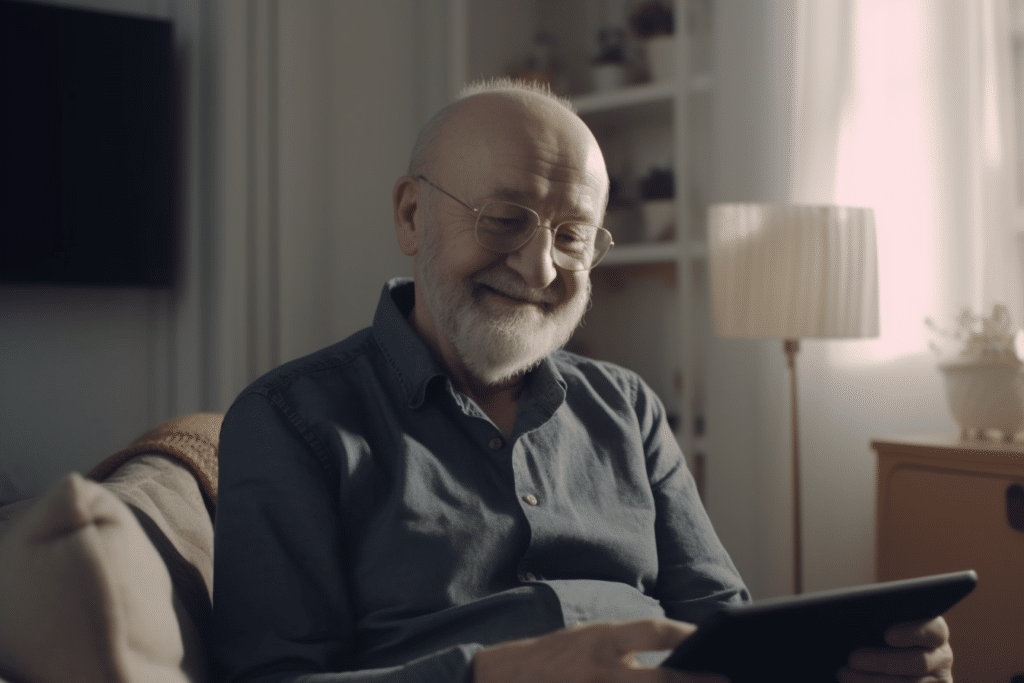Disclaimer: This article is adapted from a news release published by University College London (UCL): “Regular video calls help lifestyle changes reduce dementia risk” – UCL News, July 2021.
How Video Calls Can Help Reduce Dementia Risk
Can a simple video call do more than just keep you connected? According to a study by University College London (UCL), the answer is yes—especially for those at risk of dementia.
A UCL-led research project found that regular group video calls helped older adults make healthy lifestyle changes that may lower their risk of dementia. These included improvements in diet, activity levels, cognitive stimulation, and social engagement.

A Smarter Way to Stay Healthy
The study was meant to run as in-person group sessions, but when COVID-19 hit, the team had to change plans and move everything online.
“When the face-to-face groups we designed could not go ahead, we explored how to provide the intervention to people in their own homes, during the pandemic,”
said Professor Claudia Cooper (UCL Psychiatry), the study’s lead author.
“Facilitators helped participants set up Zoom, and organised food deliveries so groups could try out new recipes and share healthy foods, over Zoom.”
The remote programme not only maintained momentum during lockdowns, but also revealed a new opportunity: bringing brain-health coaching into people’s homes, via video call.
Why It Matters for People with Cognitive Challenges and Memory Loss
For people living with memory loss or early cognitive decline, it’s often difficult to build and stick with brain-healthy habits. Isolation, forgetfulness, and lack of routine can make things harder. However, regular video calls can offer support, structure, and encouragement.
Video calling adds a layer of social engagement that phone calls can’t match. Seeing familiar faces helps trigger memory, reduce anxiety, and reinforce routines. It’s especially the case when calling is made easy with one-touch devices like the Konnekt Videophone. The Videophone uses large photo-based buttons and doesn’t require tech know-how.
The study shows that seeing and chatting with someone regularly on a video call can help people stick to healthy habits and make lasting changes.

The Link Between Connection and Brain Health
UCL’s findings reinforce a growing body of research that points to social interaction as a powerful tool for protecting the brain. Just a few minutes of meaningful conversation a day can:
- Reduce loneliness
- Support mood and emotional well-being
- Reinforce memory through routine and familiarity
- Encourage physical and mental activity
Real Voices: What Participants Said
Celina Ho, a London resident in her 60s, participated in the pilot programme and found the experience life-changing:
“I knew what I needed to do to take care of my health, but I wasn’t actively doing everything I could be doing,” Celina said.
“By working as a group with this programme, I learned from other people and was encouraged to do more for my own health. I learned that my local council has classes that I’ve now started taking, for computing and cycling, and I’ve also started eating a healthier diet.”
Many participants felt the same way: being part of regular video calls made them feel connected to others and gave them a gentle push to keep up with healthy changes.
Learn More
Want to explore more ways to support brain health and connection through technology?
Download our free dementia e-book to discover expert insights, practical tips, and video-led exercises that make a real difference.

Simple Tech, Big Impact
At Konnekt, we believe that technology should be an enabler—not a barrier. For people facing cognitive challenges or memory loss, complex devices can create frustration and missed opportunities for connection.
That’s why the Konnekt Videophone is designed to be simple, visual, and stress-free. Family and carers can start calls or use remote check-ins. It allows the user to focus on what matters: seeing familiar faces, hearing friendly voices, and staying connected.
As far as we know, video calling isn’t just a social tool—it’s a brain-health strategy. Whether you’re a family member, caregiver, or healthcare professional, it’s important to help someone stay connected. This support can lead to a healthier and more independent life.
